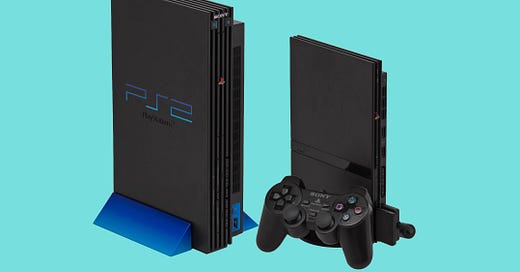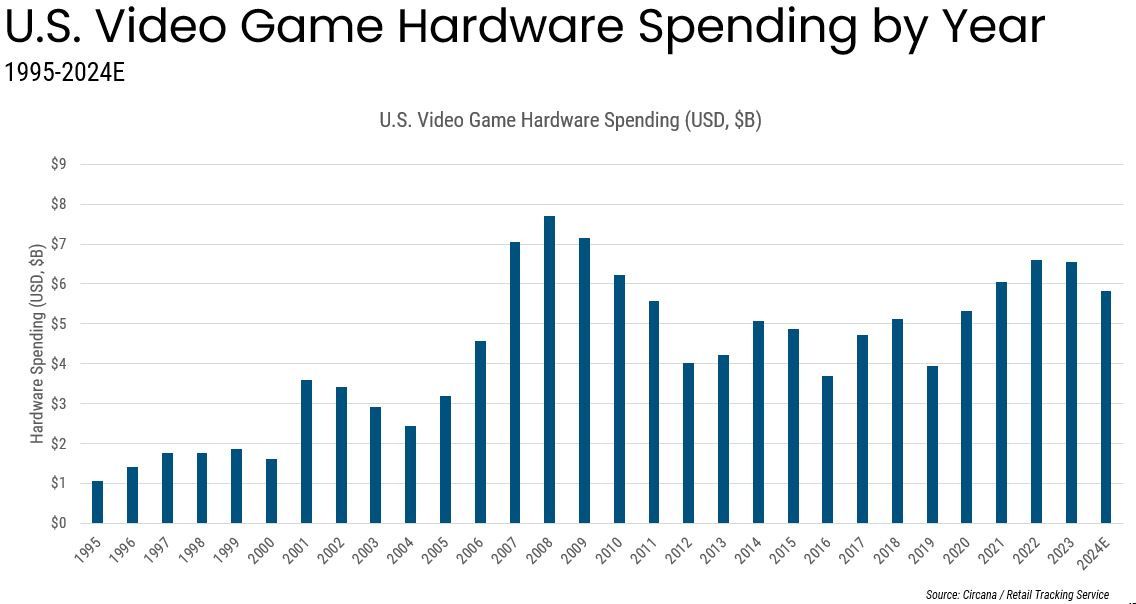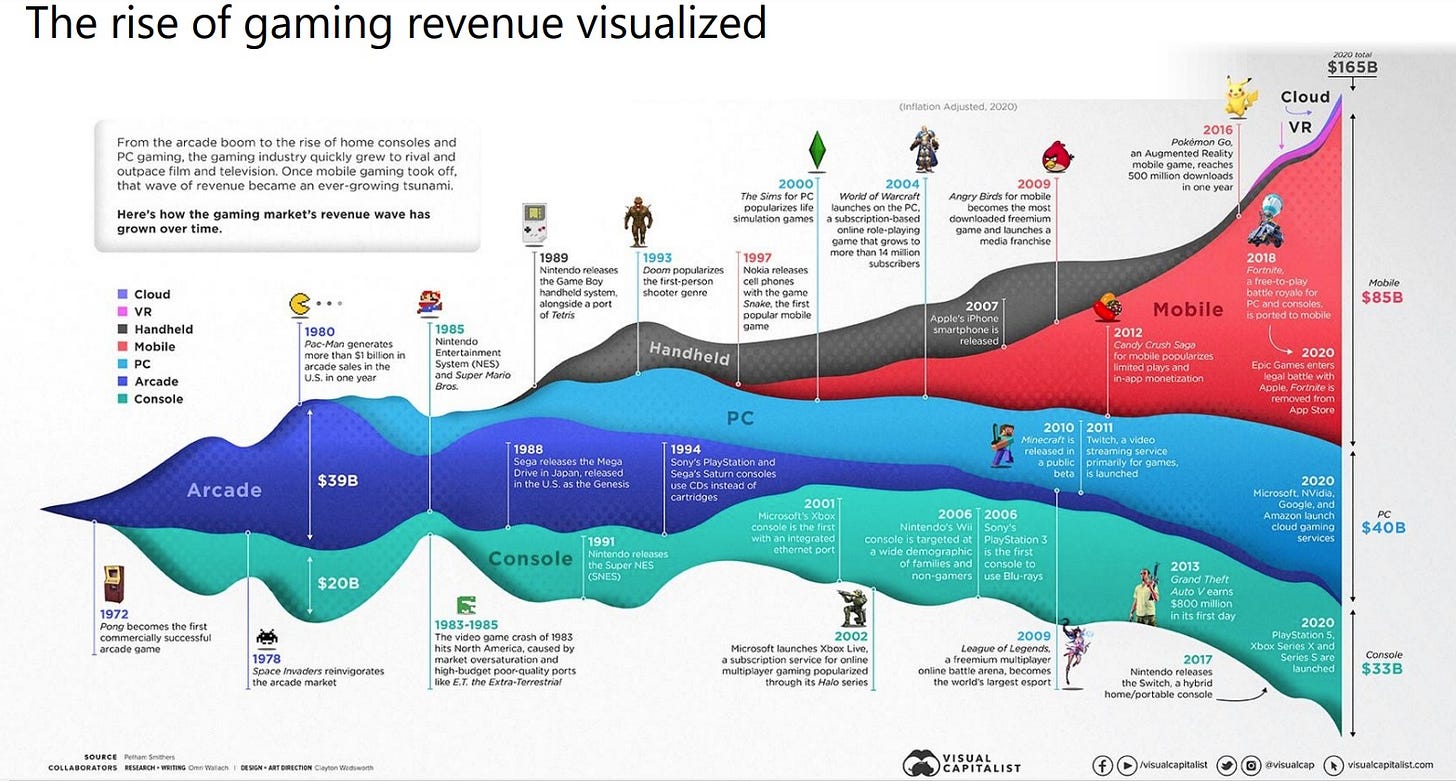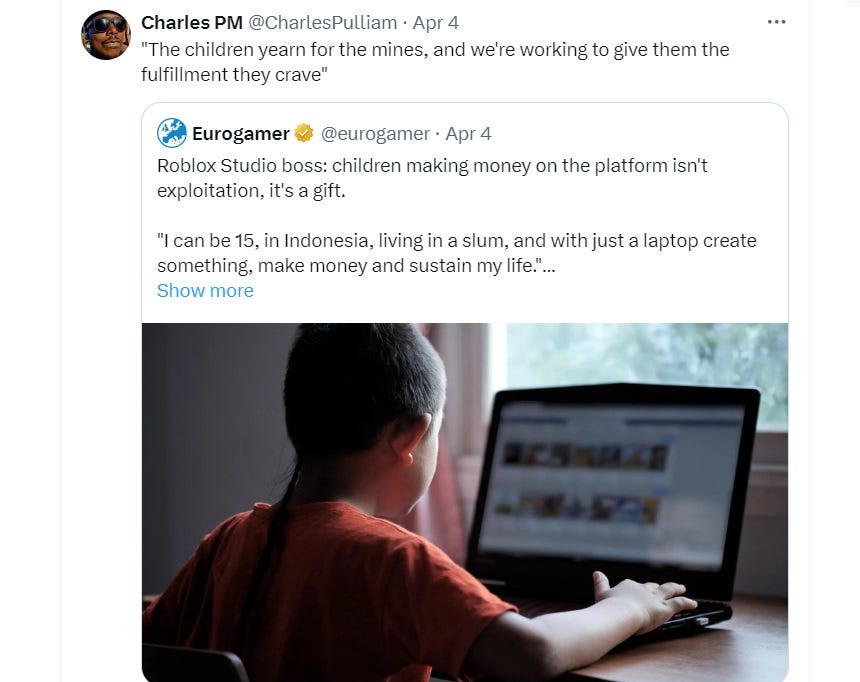Console Gaming No Longer Pays The Bills
And Ubisoft's chief portfolio officer steps down on the eve of Star Wars Outlaws and Assassin's Creed Red
Jim Ryan’s final act as the head of PlayStation was to go on a podcast and lob one last grenade in the console wars. What was the most memorable part of the 2000s for the veteran Sony marketing guy? “I would say 160 million, “ he responded, “which is the number of PS2s that we sold.” That’s 5 million higher than the previously reported (and hotly debated) number, and an even harder best-selling-console-off-all-time record for the Nintendo Switch, currently at 139 million units sold, to beat.
Hardware rivalries aside, the data point underlines a harsh reality about the current state of gaming that’s driving a lot of anxiety: consoles have hit a ceiling. Despite more players overall, the console market is tapped out, with no new piece of dedicated hardware likely to ever match the PS2’s success, let alone surpass it. This is what former chairman of Sony Interactive Entertainment Worldwide Studios, Shawn Layden, had been predicting for years, and what Microsoft Gaming CEO, Phil Spencer, recently blamed for brutal cutbacks at his company and others.
“I don't think we're doing a good enough job finding new players,” Spencer told Stephen Totilo’s Game File earlier this year. “Let's pick consoles as a good example: We found 200 million global households that will play console games. And that number really hasn't changed in the last five, six years.”
Annual spending on gaming consoles, including portable handhelds, peaked in 2008 by a country mile, according to data form Cicana (previously known as NPD). The Xbox 360 was doing well, the PS3 was picking up steam after being outsold by its predecessor for the first year of its life, and the Nintendo DS and Wii were both exploding simultaneously (the Switch would have to sell over 100 million more units to hit their combined total). Then the global recession hit and smartphones started taking over. Console gaming didn’t die like some predicted. It’s still an incredibly lucrative business for the big players involved. But it’s no longer enough to sustain the annual growth shareholders demand.
As analysts told IGN’s Destin Legarie, this means companies are trying to meet players in other places, PC and mobile as well as movies, TV, and theme parks. They’re also trying to soak the ones they already. Some of these moves are completely reasonable and overdue, like simply raising the price of new games. Some of them feel much more manipulative and predatory, like charging premiums for early access and bonus features, or cramming ever more expensive microtransactions into games that aren’t even free-to-play and genres that haven’t traditionally had them.
It doesn’t help that live service games have hallowed out the market for new console releases. A Newzoo report presented at GDC last month claimed that the majority of play time in 2023 was for games that came out six-years ago or longer. The list of top games included Call of Duty, Rocket League, and The Sims 4, but some of the biggest ones were Fortnite, Roblox, and Minecraft. The ones in the first bucket are multiplayer games with storefronts. The ones in the second bucket are social platforms centering user-generated content that happen to have games inside of them.
While this has led to a lot of industry carnage and “avoidable fuckups,” I think it’s also marked an inflexion point for fans of console gaming and fears that it will no longer be the nexus point for the medium. The same way TikTok and YouTube have displaced TV and movies for younger generations, there’s a concern new players will spend all of their time and money in Roblox or Fortnite instead of downloading the latest prestige indie game or premium blockbuster outside of a very small list of first and third-party franchises owned by five companies.
This type of omnivorous console gamer has always been a minority compared to the person who just buys Madden every year. Still, those types of super fans also spend a ton of money, show up on day one of a new hardware launch, and drive the online conversations around gaming that shape its wider perception and culture. But it’s clear they’re a tapped out audience when it comes to the major console makers and publishers, especially compared to the kid nagging their parents for more Robux every time they’re in the supermarket checkout line.
To see what these types of console gamer anxieties look like, look no farther than the App and Google Play stores. What seemed like a promising new affordable delivery system for games pushing the medium forward eventually gave way to a graveyard of junk. Nintendo all but abandoned mobile after a few middling experiments, Microsoft simply bought Candy Crush outright, and Sony is still trying to figure out how to ship something on the platform. The biggest mobile success story of last year was Monopoly Go, a licensed spin-off designed to turn brain chemistry into monthly revenue that spent $500 million just on getting new players hooked.
This month marks the 10th anniversary of Monument Valley, a beautiful mobile puzzle game that gestured at new aesthetic frontiers on a platform that hadn’t yet been colonized by dark patterns. Lewis Gordon has a terrific retrospective on the game’s legacy and how it was intertwined with Apple’s devices over at The Ringer (full disclosure: I’m quoted in it). Games like Monopoly Go and Candy Crush were maybe always destined to dominate mobile gaming. Apple and Google making it impossible to find or learn about more enriching, bespoke, or experimental games on their app stores was a choice though.
“It almost feels like a glimpse into a parallel existence,” ustwo Games’ chief creative officer, Danny Gray, Gordon about making Monument Valley 3 in the year 2024. “One where we didn’t optimize for analytics, monetization, and attention capturing, but one where, somehow, as an industry, we optimized for quality and beauty instead.” It’s easy to dismiss console gaming anxieties as just people being uncomfortable with change, especially when some of the loudest voices associated with it are toxic console warriors or cultural reactionaries. Personally, I think the skepticism is warranted when I see executives point to the platform economics that have led to “enshitifation” everywhere else online as greener pastures for the future of gaming.
Comings And Goings
Yu Miyake, the long-time top producer on Dragon Quest, will step-down to focus on heading up Square Enix's smartphone games following internal delays of Dragon Quest XII, Bloomberg reported. The Japenese RPG publisher's young, new president, Takashi Kiryu, is continuing to shake-up its corporate structure to focus on streamlining production and develop more AAA games in-house.
The news made at least one person happy. Sonic co-creator Yuji Naka, who is serving a suspended 30-month prison sentence for insider trading about a Dragon Quest smartphone game while working for Square Enix on Balan Wonderworld, accused Miyake of lying to get him convicted. “Finally. I was hoping he would be gone soon because he is the kind of person who would submit a note with a lie (with evidence) to a court of law,,” he tweeted according to VGC. “I have never met him, but the new [Square Enix] president might be a good person.”
Kareem Choudhry is leaving Microsoft after 26 years, Windows Central reported. The “legendary” Xbox VP who was a key figure in recent initiatives around backwards compatibility, cloud gaming, and AI chat bots, departs amid a wider-shakeup within Microsoft’s gaming division. Chouhdry’s team will get folded into the Xbox hardware while a new Xbox Experiences and Platforms team will “re-energize investment in polishing the overall Xbox experience across Windows and Xbox consoles.”
The Verge reports that these organizational shuffles come as Microsoft is still reviewing additional first-party games to bring to competing platforms like Switch and PS5, with Sea of Thieves being a test case for that strategy. Microsoft will reportedly hold its not-E3 summer showcase on June 9 where there are rumors of Gears 6 and the next Call of Duty: Black Ops set in the Gulf War being shown.
Chief portfolio officer Sandrine Caloiaro is leaving Ubisoft after a decade of service there, the company confirmed to Dead Game in an email. She was promoted to that position in 2021 amid a multi-year reorganization for the French publisher following a workplace reckoning and some disappointing releases like Ghost Recon Breakpoint. With a background in consumer research, Caloiaro led a newly minted Brand Portfolio Management team that used a “player-first mentality” to manage the direction of the company’s biggest franchises. The group was part of a power-struggle within Ubisoft over the broader creative visions for its games, including which ones got made, how its biggest series’ evolved, and how they would be monetized.
“We can confirm that Sandrine Caloiaro has decided to leave Ubisoft,” a spokesperson for Ubisoft wrote in an email. “Sandrine was instrumental in building and strengthening Ubisoft’s consumer and market knowledge practice and in accelerating the development of our portfolio, brand, and monetization strategies. We warmly thank her for her many contributions. Her teams will now report to Marie-Sophie de Waubert, Ubisoft’s Chief Studios and Portfolio Officer.
The change comes as the company races to regain momentum after years of delays, cancellations, and stagnation with the upcoming launch of Assassin’s Creed Red and Star Wars: Outlaws (the August 30 release date for which leaked earlier today). The Editorial office, once all-powerful under former chief creative officer Serge Hascoët, who goes on trial in France next year for workplace harassment, has fallen out of favor in recent years, Dead Game understands, with Brand Portfolio Management taking more of the lead.
“I am grateful to have spent more than a decade working alongside the talented teams at Ubisoft and am proud of our achievements,” Caloiaro said in a statement shared by Ubisoft. “I am confident that Ubisoft’s teams will continue to create great games and I wish them every success in the future.” She did not say why she was leaving or where she was headed next. Ubisoft declined to comment on whether it planned fill her position in the future.
Other Links
GameStop chief operating officer Nir Patel stepped down last week after less than two years with the gaming retailer. The company’s meme stock price was over $30 when he took the job. Now it’s $11. He’ll get 10 weeks severance and a portion of his unearned signing bonus and unvested equity award. (Reuters)
Jump Ship is a really neat-looking coop space shooter with ship combat that’s coming to Steam Early Access later this year. Uses AI-generated voices “where it makes sense creatively.” (Steam)
YouTube’s biggest star, MrBeast, is apparently spending millions per video now. (Garbage Day)
The last unbeaten Mario Maker level called Trimming The Herbs was disqualified from a group’s 100% run of the game prior to the Wii U servers went offline yesterday because it was “cheated” onto the level library using a TAS (tool-assisted run), but dedicated player sanyx91smm2 managed to beat the seemingly impossible death trap anyway just in time. (NintendoLife)
Apple has ditched its ban on retro game emulators for iOS devices following an antitrust lawsuit filed by the U.S. Department of Justice. (The Verge)
Saber Interactive founder Matthew Karch said “nobody has been guided by more of a sense of fairness and reasonableness than” Embracer CEO Lars Wingefors. That sense of fairness and reasonableness was so strong, Karch facilitated a deal to buy his company back from the Swedish holding company and take it private again. (GamesIndustry.biz)
A recent patent filing shows that Smart TV operating platform Roku is exploring ways to hijack your HDMI cable and display ads directly on your TV whenever it’s not being used. (Lowpass)
Tekken producer Katsuhiro Harada thinks fighting games have become less popular because younger players prefer games where they can blame their teammates when they lose. I think it’s probably in-person gaming died and local multiplayer sessions are now as hard to come by as a Street Fighter III: Third Strike arcade cabinet. (VGC)
A group called Stop Killing Games is working to change national laws to make it harder for publishers to shut off the servers for older online games. If successful, it would likely incentivize companies to just ship games with an offline mode from the start. (Kotaku)
If your Pawn is really unpopular in Dragon’s Dogma 2, Capcom will take pity on you and rent it out to “fake” players to help them complete quests and gain more knowledge of the world. Some players were very sad to discover they’d been Truman Showed. (Gamesradar)
Microsoft has setup a dedicated team to “future proof” the Xbox’s library in an effort to support game preservation after rumors the company was going to make its biggest games multiplatform caused some longtime fans to wonder if their digital games would one day disappear. (Windows Central)
A new investigation by Reb Valentine exposed a number of issues at Life Is Strange studio Deck Nine from sexual harassment and crunch to a mysterious Nazi symbol that made it into the asset pipeline for the game without the studio ever saying who was behind it. Those who spoke for the piece also said publisher Square Enix was “outright hostile” to diverse themes in True Colors to the point of actively trying to hide the fact that the game had the series’ first canonically bisexual lead character. (IGN)








